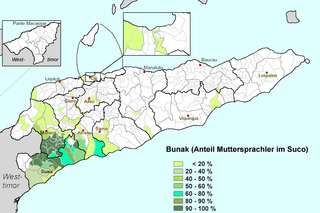Bunak language
| Bunak | |
|---|---|
| Native to | Indonesia, East Timor |
| Region | central Timor |
| Ethnicity | Bunak |
Native speakers | 76,000 (2010)[1] |
| Official status | |
Recognised minority language in | |
| Language codes | |
| ISO 639-3 | bfn |
| Glottolog | buna1278 |
| ELP | Bunak |
 Distribution of Bunak in East Timor (West Timor not shown) | |
The Bunak language (also known as Bunaq, Buna', Bunake, pronounced [bunaʔ]) is the language of the Bunak people of the mountainous region of central Timor, split between the political boundary between West Timor, Indonesia, particularly in Lamaknen District and East Timor. It is one of the few on Timor which is not an Austronesian language, but rather a Papuan language of the Timor–Alor–Pantar language family. The language is surrounded by Malayo-Polynesian languages, like Uab Meto and Tetum.
Bunak distinguishes between animate and inanimate noun classes.[3]
Phonology
| Labial | Alveolar | Palatal | Velar | Glottal | ||
|---|---|---|---|---|---|---|
| Plosive/ Affricate |
voiceless | p | t | tʃ | k | ʔ |
| voiced | b | d | ɡ | |||
| Fricative | voiceless | s | h | |||
| voiced | z | |||||
| Nasal | m | n | ||||
| Trill | r | |||||
| Lateral | l | |||||
| Approximant | w | |||||
- Plosive sounds /p t k/ can be heard as unreleased allophones [p̚ t̚ k̚], in word-final position.
- Sounds /b d ɡ/ can be heard as [β r ɣ] in intervocalic positions.
- /ɡ/ can be heard as [dʒ] when preceding /i/.
- /z/ can have allophones [ʒ dʒ] in free variation.
- /tʃ/ is heard as [s] when preceding /i/.
- /l/ in word-final position can also be heard as a fricative [ɬ] in free variation.[4]
| Front | Central | Back | |
|---|---|---|---|
| High | i | u | |
| Mid | e | o | |
| Low | a |
Pronouns
Pronouns seem to tie Bunak more closely to the Alor–Pantar languages, in a group Ross (2005) calls "West Timor", than with the Papuan East Timor languages. The independent pronouns and object prefixes, which appear to retain the proto-Trans–New Guinea dual suffix *-li, are as follows:
| singular | dual | plural | ||
|---|---|---|---|---|
| 1st person | exclusive | ne-to n- |
ne-li n- |
ne-i n- |
| inclusive | i-li ∅- |
i ∅- | ||
| 2nd person | e-to ∅- |
e-li ∅- |
e-i ∅- | |
| 3rd person | animate | himo g- |
– | hala'i g- |
| inanimate | homo | |||
Notes
- ^ Bunak at Ethnologue (18th ed., 2015) (subscription required)
- ^ "New Guinea World, West Bomberai". Retrieved 2018-05-20.
- ^ Holton, Gary; Klamer, Marian (2018). "The Papuan languages of East Nusantara and the Bird's Head". In Palmer, Bill (ed.). The Languages and Linguistics of the New Guinea Area: A Comprehensive Guide. The World of Linguistics. Vol. 4. Berlin: De Gruyter Mouton. pp. 569–640. ISBN 978-3-11-028642-7.
- ^ Schapper (2009).
References
- Schapper, Antoinette (2009). Bunaq: A Papuan Language of Central Timor (Ph.D. thesis). Australian National University. doi:10.25911/5d611d87406d0. hdl:1885/150147.
- Schapper, Antoinette (2011a). "Crossing the border: Historical and linguistic divides among the Bunaq in central Timor". Wacana, Journal of the Humanities of Indonesia. 13 (1): 29–49. doi:10.17510/wjhi.v13i1.8.
- Schapper, Antoinette (2011b). "Finding Bunaq: The homeland and expansion of the Bunaq in central Timor". In McWilliam, Andrew; Traube, Elizabeth G. (eds.). Land and Life in Timor-Leste: Ethnographic Essays. ANU Press. doi:10.22459/lltl.12.2011.08. ISBN 978-1-921862-59-5.
- Schapper, Antoinette (2022). A Grammar of Bunaq. Mouton Grammar Library. Vol. 86. Mouton deGruyter. ISBN 9783110714500.
External links
- ELAR archive of Zapal, an oral literature genre of the Bunaq Lamaknen
- Timothy Usher, New Guinea World, Bunaq
